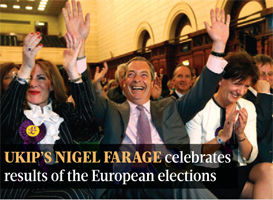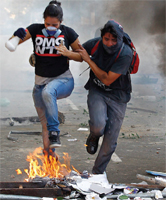The Vatican has been mediating in a political row that has led to four months of violence in Venezuela. It’s not the first time the Church has played the role of peacemaker in Latin America, and the election of an Argentinian Pope has stimulated fresh interest – from Peru and Colombia to Cuba, even the Falklands (or Malvinas). But not everyone shares Francis’ commitment to the poor, and to maintain its influence the Church must capture the hearts of the continent’s aspiring middle classes
With an Argentinian Pope at the helm of the Catholic Church, populist politicians in Latin America are doing their best to enlist him in order to promote their agendas. Within a week of Francis’ election, the Venezuelan President Nicolás Maduro claimed that the new Pope’s statements on the “option for the poor” were, in fact, inspired by Hugo Chávez from Heaven.
Argentina’s President Cristina Fernández Kirchner, whose relationship with Archbishop Cardinal Jorge Bergoglio was conspicuously lacking in warmth, announced after her first meeting with him as Pope that she had asked him to mediate in Argentina’s long-standing quarrel with Britain over the Falklands Islands (or Malvinas). The Vatican remained diplomatically silent on this but Fernández has since paid a number of visits to Pope Francis in Rome (See Jimmy Burns, page 10).
By contrast, the Vatican has accepted a request from the Government of Venezuela, as well as from the Opposition, the Democratic Unity Table (Mud), to mediate a deal that would end the violence that has plagued the country for more than four months.
Originally, the request was for Cardinal Pietro Parolin, former apostolic nuncio to Venezuela and now the Vatican Secretary of State, to mediate. Not surprisingly to those who know him, Parolin seems to have made himself respected and liked during his time in Caracas. He is sure to remain involved, but the actual “witnessing” of the Government-Opposition talks is being done by his successor as nuncio, Archbishop Aldo Giordano. So far, the talks have yielded no results.
The leader of Mud, Ramón Guillermo Aveledo, announced on 13 May that they were to be suspended. However, on 20 May, the nuncio and the foreign ministers of Brazil, Colombia and Ecuador, who are “supervising” the talks on behalf of the Union of South American Nations, Unasur, issued a joint statement in Caracas stating that “ideas” had been set out by both sides, and expressing hope for a new meeting soon.
The Catholic Church played an important role in the struggle for human rights and the restoration of democracy in Latin American states during their transition from military dictatorship. According to P. Jeffrey Klaiber SJ, recently deceased professor of history at the Catholic University of Lima, the Churches – the Chilean and Paraguayan ones in particular, Argentina is the glaring exception – undermined the dictators’ legitimacy by keeping them at arm’s length. The Churches in these countries organised the defence of human rights and helped the transition process by legitimising political opposition.
In Peru and Colombia, two countries with a long tradition of formal democracy – but also of internal war – the Catholic Church has played a similar role. In Colombia, President Manuel Santos, a strong advocate of the peace talks with the Revolutionary Armed Forces of Colombia (Farc), seems likely to win the second round of the presidential election on 15 June. But the fact that he was bypassed (by 29 against 26 per cent of the votes) by his main competitor and critic, Oscar Iván Zuluaga, indicates a deep split in the country. Should Zuluaga win, the peace negotiations could be in jeopardy. This would make the Church’s role as a force for dialogue and national reconciliation even more crucial.
Cuba looks set to be the next case where the Church can play a stabilising role during a transition to democracy. Much will depend on its ability to walk the tightrope between supporting President Raúl Castro’s reforms and, gently but firmly, legitimising the political opposition and the civil society that is emerging in Cuba.
The Church arrived in Latin America in the sixteenth century with the Spanish and Portuguese conquistadores and was closely aligned with the secular colonial powers. The Jesuit Antonio Montoya went to Madrid, not to Rome, in 1637 to negotiate, among other things, the right to arm the Indians in the Jesuit-led “reductions” so they could protect themselves against Portuguese slave hunters. While this went on, the papacy was weakened in Europe: theologically by the Reformation, philosophically by the Enlightenment, politically by the emerging nation states, by the French Revolution and the Napoleonic empire.
Independence for the Latin American states coincided roughly with the post-Napoleonic restoration in Europe. This meant, for a time, a resurgence of papal power, which was felt also in the new young states. “At century’s end, the Latin American states marched step in step at Rome’s beck and call,” Klaiber has written. This was the deeply anti-liberal, nineteenth-century papacy. But liberal, socialist and anticlerical ideas also travelled from Europe across the Atlantic. They weakened the Church’s authority both among Latin America’s governing elites and among its popular classes.
Miraculously, however, the Church managed to transform itself. The Second Vatican Council inspired the famous assembly of the Latin American Bishops’ Conference (Celam) at Medellín in Colombia in 1968, where the Church took a firm stand in favour of social justice. This was the basis for the courageous stand of many Latin American churchmen – Dom Hélder Câmara, Evaristo Arns, Oscar Romero – against poverty and political oppression. It inspired liberation theology, the theological movement most closely associated with Latin America, and many of its outstanding names, among them Gustavo Gutiérrez, Leonardo Boff and Jon Sobrino.
The 1979 general conference of Celam in the Mexican city of Puebla saw a battle between defenders and critics of liberation theology. By contrast, the final document of the 2007 Celam conference in Aparecida, Brazil (edited by Jorge Bergoglio) breathed reconciliation and consciousness of belonging to a universal Church.
Since the 1970s, the church hierarchies in Latin America (with some notable exceptions) seem to have retreated from politics to a more traditional pastoral approach. In all likelihood, John Paul II’s systematic appointment of more conservative bishops has reinforced this trend. But the political, social and economic contexts have changed too. Military dictatorships have given way to democracy. Economies, with the exceptions of Argentina and Venezuela, are doing well.
Does that mean that liberation theology has become irrelevant? No, argues Pedro Trigo SJ, a Spanish-Venezuelan theologian, in his book Is Liberation Theology Dead?. The context is different, the content of the questions posed must be different, but the method remains: to work with rather than for people, receiving and learning as well as giving and teaching. This work now seems to be carried forward by religious orders on the ground.
On 9 April, the Religious of Paraguay marched in support of 14 campesinos (small farmers) imprisoned for two years without trial, accused of armed conspiracy in connection with a land dispute. On Good Friday, I heard Oscar Ramírez, vicar of Santa María parish in southern Paraguay, compare the calvary of the incarcerated farmers to that of Christ.
There is more emphasis on spirituality in today’s mature liberation theology. What seems lacking is the fruitful interchange between theologians, activists and bishops that characterised the 1970s. Will the recent acknowledgement by Cardinal Gerhard Müller, prefect of the Congregation for the Doctrine of the Faith, of liberation theology as an important current of Catholic theology, alter that? Will Pope Francis’ emphasis on pastoral qualities in episcopal candidates? That remains to be seen.
Francis’ theology is a “people’s theology” – liberation theology minus the conflict perspective. But can conflict be avoided? Not everyone in an economically up-and-coming continent supports his “option for the poor”. In Brazil, the success of Protestant Churches is partly explained by their encouraging people’s ambition to get richer and to join the middle classes. The conflict in Venezuela seems in part to be a struggle between a populist government and a frustrated middle class. The same tension exists in Argentina.
Winning the middle class without deserting the poor will be a huge challenge for Francis in today’s Latin America.
Ulla Gudmundson is a writer and former Swedish Ambassador to the Holy See.





 Loading ...
Loading ...
What do you think?
You can post as a subscriber user...
User Comments (0)